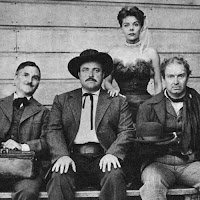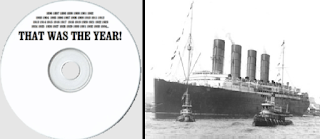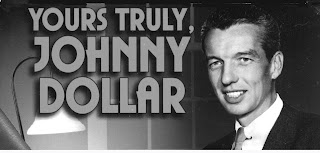This book is structured a bit differently than the others. The first half is collected writing from other sails, (to Fiji, to the Galapagos, to New Brunswick) and the last half is the sail across the Pacific (from Honolulu to New Guinea.)
Everything is all very fascinating, the pictures are better than ever, and while not as neatly organized perhaps as the other sailing books, there is two or three times the amount of material. It’s like a box set, or a WFBJR triple album. It also has a nice tactile feel, the blue faux leather of the hardcover is very pleasant against your fingers. These things all combine in the Map Room of my mind like the sunlight through the staff of Ra, illuminating the journey within.
THE CREW
We've met everyone here before. Hello again, folks.
 |
| Plus Captain Allan Jouning and a a few crew, and chef Liz Wheeler. |
They brought David Niven along, too, in the form of the tapes of his reading from his two memoirs. It's unfortunate they hadn't started the sails earlier and had David along for one of them. But alas. Bill and Van both notice a slight change in their friend's voice and identify it for what it must have been: the onset of the last stage of the disease that ended up killing him. "The dying actor, giving a great performance; an eternal theme, eternally inspiring."
At the onset, one of the crew members (Noddy) injures his hand severely enough for the boat to return to Hawaii. An ominous beginning, but no one else is seriously injured from that point on, although a variety of factors conspire against the planned itinerary.
I haven’t spent much time on Allan Jouning, as he tends to hang back on these voyages, as any charter captain usually does. The deal with Dr. Papo is Bill was Captain, but Allan had the right of overrule for any situation where he felt Bill's decision might endanger the boat. That never happened on any of their cruises together, so they by all accounts got on well together. He captained several other megayachts (like the Elixir) and continues in the field today. I imagine if he wrote a book it'd be filled with the world's richest people and most exotic locales, but his professional integrity hinges on never uttering a word. Too bad for the rest of us!
THE OTHER SAILS
This part of the book is great, I'll spend time on only two anecdotes:
- Man did, Bill like the Azores. This is undoubtedly an outgrowth of both the natural beauty of the island chain and its association with The Big One. (See Airborne.) "Black basalt beaches, moors and pastures, cliffs and mountains, spas, geysers, still active volcanoes, and an air force base – see them now before a definitive eruption cause that haunting archipelago to sink into the vast deep." I've never been to the Azores - sounds lovely - but when I was a writing tutor at Rhode Island College, I tutored several folks from there and from Cape Verde. RI has a sizable Portuguese presence. Not much economic opportunity - sort of like Rhode Island! - but lots of natural beauty.
A tidbit I did not know: the name of the Portuguese captain who formally claimed the islands in 1427 is unknown, as George Sand spilled ink over the chart, only copy. Pumba!
- This part is incredibly funny:
So the story is, while sailing near Craig's Point in the St. John River, they approached a landing and asked if they could use the man's property to get to the road and throw trash. The man pointedly said no, keep sailing. Bill et al. thought his attitude quite rude, so they sailed out of their way to get somewhere they could throw their trash, then went back to sea, where Bill pinned an editorial over-exaggerating the kindness of "the angel of Craig's Point" and recommending all sea travelers call upon him for his generosity.
Well, the angel in question thought tit-for-tat was fair, so he penned a counter-article alleging all sorts of things about Bill. Not before the editors of the Cruising Guide to New England )(the edition includes New Brunswick) contacted Bill (not knowing any of the tongue-in-cheek-ness) and asked if they could include his piece in their latest edition. It all kind of escalated quickly. Good stuff, though. Years later, they were still tormenting their Craig's Point nemesis by gunkholing nearby and floating messages in emptied wine bottles ashore.
"Important... Reward... The finder of this bottle can claim a fifty-dollar reward by presenting the bottle to Aubrey Pope, Esquire, at Craig's Point, Morrisdale, New Brunswick. The reward will be payable to Mr. Pope. 'This bottle represents the gratitude of the Canada Beautiful Society Ltd. Garbage Collection Division, WF Buckley, corresponding secretary, care editor, St. John Telegraph."
THE PREP
The amount of South Pacific sailing prep Bill did was truly impressive. This was all pre-internet, of course - I say that a lot to denote the extra legwork such things require, but it's remarkable: I mean, we've been "post-internet" for only a handful of decades. Which means almost the entirety of the human scholarship that got us to the internet age was "pre-internet." I should find a different way of putting that.
Anyway, everything all sounds like I want it in my library: the index of back issues of Associate Members of the Seven Seas Cruising Association (Louisiana), Landfalls of Paradise by Earl Hinz, Me and His Island by Tom Neal, Westward Bound by the Schooner. Yankee by Irving Johnson. Also Alistair Maclean’s biography of Captain Cook (Got that one but never read it) and Moxie by Phil Weld. Which I did read. I agree with Bill - fascinating account, but solo sailing just doesn't hold much appeal for me. “It is as if, coming on the lone copy of an unknown sonnet of Shakespeare, one were to read and then toss it away, internalizing the pleasure, but only for the first length of time the lines stay vivid in the memory. There is none of the enduring satisfaction of the shared pleasure.” I suppose the book is the shared pleasure, but it's one step removed from the pleasure Bill received from doing it his way. To each his own.
As per usual the pre-voyage wine tasting and food prep sounds like a blast.
I was also amused by Bill's efforts in securing (again, pre-internet) exotic Swedish crackers and other culinary snacking for the voyage, efforts which were not duly appreciated by the younger Buckley, which precipitates some fun snarking back and forth.
THE PACIFIC
I like the island life/ portraits very much. Most of the book is about the sailing itself, of course, or life aboard in-between the islands on an increasingly hurried dash (see title). Their first stop is Johnson Atoll – where the nerve gas is kept - but they are discouraged to discover they are not allowed to land there.
Victory at Sea by Richard Rodgers is played, with gusto, when crossing the International Date Line, thus waking up the aforementioned ambassador to France. That one's been following me around lately. I bought the vinyl recently and ever since it's been popping up everywhere I look.
As with the others, we get some fascinating glimpses of GPS peeking through the clouds at our seafarers. The future is calling. Here it is the Trimble Loran, designed to let you know where you are at any point on the Earth's surface. “Unlike the sun it does not sleep half the time, just when you need it the most, or tease you at other times behind clouds. (It) like the Constitution or the IRS - is forever."
“When two dimensional GPS is thoroughly established (late in 1987, the three dimensional mode, designed for airplanes, is scheduled for a year later), ships at sea, or ships groping for an alien harbor – or for a cut, or for a buoy, or for a fairway marker – will know, at any moment of the day or night, where they are, give or take fifty yards. When coming into major ports they will know where they are within two or three yards. Airplanes, in the days immediately ahead, will substantially increase the running knowledge of exactly where they are, and blind landings – which not all that long featured Clark Gable with a flyer’s helmet, a wind and a prayer, and a deeply furrowed brow – will be effortless. Helicopter pilots will be able to fly sideways between palm trees at night, assuming no one has moved the palm trees during the day. Surveyors, oil drillers, dredgers, pipeline layers, cartographers, fleet owners, police, ambulances, all will depend on GPS. And not inconceivably the fancier car models of 1989 could offer, for a thousand dollars, hardware that will exactly locate your car’s position, and software, that when you grope to find 322 Beacon Street in Boston, will lead you there, quietly, authoritatively via a little screen on the dashboard directing you were to turn, or a voice synthesizer advising when you do so. I suppose Microsoft will provide a version that will describe historical curious en route. (Ed. They do - and more.)
Lots of mechanical issues in this one, as recorded here:
Was any of this the fault of the owner? Perhaps a bit? Is this a message to Dr. Papo from Bill etl. al? They do charter Sealestial again for Windfall, and there's even more snark there. I think Bill had reached the end of his rope with Dr. Papo. Probably no two boat-owners can ever agree on how to maintain a boat, and it's as simple as that.
THE ENDING
An uneven book and kind of crashes into the ending, which symbolically represents the trip itself perhaps. Van – typically not given to impatience or anxiety – began showing signs of both as the date of his retirement lunch with George HW. Bush in Paris grew closer, leading to a compressed itinerary that led to Christo’s remark appropriated for the title. I’d have liked a larger epilogue, (how did Van’s retirement party go?) Although the one that’s there is funny.
And that's it. Ocean-Three in the books.
We started this Personal Adventures At Sea and On Land with Windfall, which is the chronologically last in the series, but there'll be one last post on the peripherals and endings.
See you then.





























































